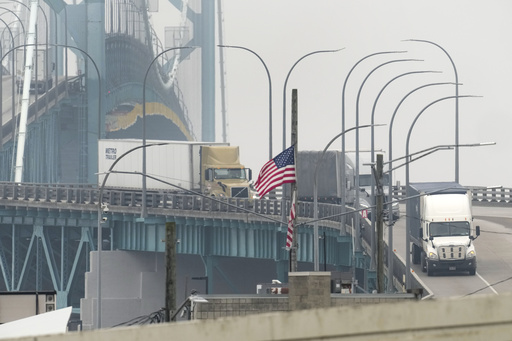
TORONTO – As Canada grapples with the implications of U.S. President Donald Trump’s trade war and his provocative remarks about making the nation the 51st state, it has become evident that one of the most resilient and friendly partnerships in the world is currently fractured.
Many Canadians are experiencing a profound sense of betrayal, as Trump has initiated a trade conflict with this northern neighbor and long-standing ally. He has consistently threatened Canada’s autonomy and has proposed hefty tariffs of 25% on Canadian goods. However, Prime Minister Justin Trudeau has indicated that the tariffs will be delayed for at least 30 days, which comes after his assurance of increased cooperation along the border.
There is widespread discussion and disapproval across Canada. Canadian hockey fans have recently booed the American national anthem during National Hockey League games, underscoring rising sentiments against their southern neighbor. In a nationwide address, Trudeau echoed the feelings of betrayal shared by many Canadians, reminding the U.S. of the joint military efforts in Afghanistan and the collaborative responses to various crises like California wildfires and Hurricane Katrina. “We were always there standing with you, grieving with you, the American people,” he stated.
Concerns have arisen that the unease could extend beyond just the present moment. “The damage is going to be long-lasting,” noted Robert Bothwell, a Canadian history and international relations professor at the University of Toronto. He added that Americans may struggle to regain Canadian trust, describing the idea of Canada becoming the 51st state as “contemptuous.”
This situation raises questions among Canadians about how they have become the target of such animosity.
The bond between the two countries is unique in the world, with approximately 3.6 billion Canadian dollars (about 2.5 billion U.S. dollars) worth of goods and services crossing the border on a daily basis. Canada is the leading export destination for 36 U.S. states, with 77% of its exports going to the U.S. Roughly 400,000 individuals cross the world’s longest international boundary each day, with extensive cooperation in defense, law enforcement, and cultural exchanges.
“Is he really coming after us?” questioned Doug Ford, the premier of Ontario, stating that the feelings among Canadians are akin to being betrayed by a family member. He remarked that “I’ve yet to hear one American citizen say Canada is the problem.”
As a result of escalating tensions, many Canadians are actively seeking to purchase domestic products over American goods, and some are even rethinking travel plans to the United States. According to the U.S. Travel Association, such tariffs could significantly affect Canadian tourism and spending in the U.S., especially since Canada represented the largest source of international visitors to the U.S., with 20.4 million visits recorded last year.
“This situation is unprecedented and highly damaging to the relationship,” said Daniel Beland, a political science professor at McGill University in Montreal. He noted that Trump’s threats have eroded trust among Canadians, particularly since the two nations have historically enjoyed robust economic, cultural, and geographic connections.
Beland labeled the relationship’s current state as one of the most challenging moments in Canada-U.S. relations since Canada’s inception in 1867. He emphasized that Trump’s comments about Canada potentially becoming the 51st state directly challenge the nation’s sovereignty, highlighting a lack of respect for Canadian institutions.
In response, Canadian authorities announced the implementation of 25% retaliatory tariffs on various American imports such as beverages, cosmetics, and paper products, with plans for a more severe second phase.
Trudeau expressed hope that Trump would refrain from “punishing” Canada. Meanwhile, Trump agreed with Mexican President Claudia Sheinbaum to delay their proposed tariffs for a month to facilitate further negotiations, while Mexico intends to deploy national guard members to combat drug trafficking.
Trudeau also lauded the strong economic, military, and security partnership that the U.S. and Canada have forged over the years, asserting that it has attracted global admiration. “As President John F. Kennedy once said, geography has made us neighbors, history has made us friends, economics has made us partners, and necessity has made us allies,” he remarked.
Despite claims of a more amicable resolution, the situation remains tenuous, with Trump signaling intentions to impose tariffs on Canadian energy, which could profoundly affect cross-border oil trade. Canada supplies over 4.3 million barrels of oil daily to the U.S., which consumes around 20 million barrels. Despite this, Trump continually states that the U.S. can do without Canadian resources. He recently reiterated his wish to see Canada integrated as the 51st state.
U.S. Vice President JD Vance also expressed skepticism, questioning Canada’s commitment to NATO military spending and efforts to stop drug trafficking into the U.S.
Canada has proposed a billion-dollar initiative to enhance border security even though significantly fewer illegal immigrants and drugs enter the U.S. through Canada compared to Mexico.
The temporary halt to the tariff threat has done little to soothe Canadian sentiments. One prominent columnist described the delay as merely a “30-day pause on wrecking our economy in exchange for some border theater.”
While there have been rough patches in Canada-U.S. relations in the past, such as limited trade conflicts and differences that arose during the Vietnam War, the current situation is unlike anything seen before. Trump’s earlier criticisms of Canada’s trade policies and Trudeau have only intensified in this climate, and comparisons have been made to hostile foreign interferences.
The booing of the American anthem continued at a recent NBA game in Toronto, where one fan notably sat motionless wearing a Canadian hat. Joseph Chua, an importer, mentioned his expectation of facing the tariffs “pretty directly,” denoting feelings of bitterness and disappointment. “I’ve always stood during both anthems, but today we’re feeling a little bitter about things.”

